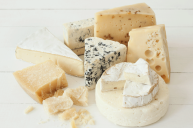As a wine lover and writer, nothing frustrates me more than hearing people say they can only drink white wine because it doesn't have sulfites, alluding to the famous red wine headaches that follow a night of heavy imbibing. Actually, white wine does have sulfites. In fact, sulfites is a necessary part of the fermentation process and white wine usually has more added sulfites than red.
Videos by Wide Open Country
Frederick Freitag, associate director of the Diamond Headache Clinic in Chicago and a board member of the National Headache Foundation, says red wine headaches aren't a normal side effect of consuming sulfites in wine:
"I grow a small number of grapes and make my own wine, and if you don't do something to shut down the native yeasts and bacteria that come in with the grape skin, you're going to get wine that is absolutely horrific. Sulfites are the most benign way of doing that, but they don't cause headaches."
Dried fruit and processed lunch meat contain more sulfites per serving than wine does. However, there are people with a sulfite sensitivity. If you have an allergic reaction to sulfites in wine, you'll likely have a reaction to any food that contains sulfites, not just to wine.
Other people are sure that the tannins in red wine are their migraine trigger, because red wine contains higher levels of tannin. This preservative (which is different from sulfites, by the way) occurs naturally and is found in grape skins.
So why do people get headaches from wine? If you are prone to R.W.H. (red wine headaches), here's what might be causing the problem.
1. Histamines
If you have have allergies, you know what an antihistamine is (it's the medicine that stops us from sneezing). Histamines are produced by your body whenever your immune system detects a threat, and if your body produces too much histamin, your system tries to get rid of it which results in headaches, hives, and breathing and digestive issue.
A lot of foods naturally contain histamine, especially fermented foods or beverages. Like wine, and especially red wine. Dan L. Keiller, President of the newly formed Medical Wine Interest and Education Society in San Diego, researched histamines in wine and found that "red wines, in general, contain more histamine than Champagnes or sparkling wines and those usually contain more histamine than [still] white wines."
People who experience histamine intolerance typically lack two major enzymes to help them metabolize the histamine. Because everybody reacts differently, it can be hard to tell what and how much of certain things like red wine you can eat or drink. You may be able to tolerate one glass of red wine, but if you drink that glass of merlot with aged cheese and salami, the combined amount of histamine could trigger a bad reaction.
Histamine reactions are linked with people who have low levels of an enzyme that can help them metabolize the histamine. The exclusion of this enzyme is likely the reason for the headaches.
One word of advice: Do not take antihistamines while drinking alcohol. The potential drug interactions are not worth it. First-generation antihistamines, like Benedryl, can make you sleepy, and if you add the effect of alcohol to the drug effect, can make you dizzy or drowsy. Newer antihistamines may not make you as sleepy, but they can still react with alcohol. Talk to your doctor or a pharmacist (even if you're buying over the counter allergy medicine) about drinking alcohol at the same time.
2. Tyramine
Tyramine is a naturally occurring amino acid found naturally in some foods. It's especially found in aged cheeses, cured meats and, you guessed it, wine.
If you've noticed that your red wine headaches are worse when you combine two tyramine-heavy foods together (think wine and cheese or charcuterie and wine), then this could be the culprit for your headaches. Yes, a glass of cabernet sauvignon goes perfectly with cheese, but it could also be the answer for headache sufferers!
In the 1960s, research found that people prone to migraines who also had a deficiency of MAO, or monoamine oxidase - an enzyme in our body that breaks down tyramine, had headaches after they ate foods containing tyramine. Since there is no cure for tyramine reactions, your best bet is to avoid foods that contain them.
3. Prostaglandins
Prostaglandins could be another reason for your R.W.H. Prostaglandins are hormone-like lipid compounds present in all animal tissue and also found in red wine.
For some people, consuming wine will force the temporary change of prostaglandins in their body resulting in a wine headache. Ibuprofen or acetaminophen may help to prevent/relieve these kinds of headaches because they are prostaglandin inhibitors.
Editor's Note: You should consult a medical professional before consuming pain relievers prior to drinking. Some pain relievers specifically caution against taking them if you consume three or more drinks a day.
4. Tannins
Tannins are the flavonoids in wine that create a dry effect and taste. They are found in grape skins, seeds and stems. And since red wine is made with grape skins, it is higher in tannin content than white. (It's also why your pinot noir is red instead of white.)
For some, the consumption of tannins results in the opening up of blood vessels, a condition called vasorelaxation, which can lead to a headache.
However, Marion Nestle, chairwoman of the Department of Food Studies at New York University, dismisses this theory because tannins are also present in tea, chocolate and soy, and rarely do people complain about headaches surrounding those items.
https://www.instagram.com/p/BQ5KOzxBEQo/?taken-by=simmerandscribe
A R.W.H sufferer himself, Freitag says there is only one way to solve the problem. Since all wine is made differently, he suggests sampling some to see if it is the one for you as one variety may not have the expected headache reaction.
"If you really like red wine," he says, "you should try different brands, different grapes and different countries of origin. That is the only way you are going to find out."
This post was originally published on May 7, 2018.




